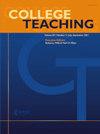大学生与课堂出勤率:贫困和疾病如何通过惩罚性出勤政策影响学生的成功
Q3 Social Sciences
引用次数: 0
摘要
摘要本研究考察了在一所大型城市大学就读的学生中贫困和疾病的普遍程度,并调查了这些挑战如何影响出勤率,包括未能满足出勤率要求如何对这些学生的课程成果产生负面影响。通过匿名调查,520名学生回答了“教授缺乏灵活性”、“食物不安全”、“住房不安全”、“抑郁、焦虑”、“慢性疾病”等问题。超过一半的受访者表示有一定程度的食物和住房不安全,超过一半的受访者表示有焦虑、抑郁或慢性疾病。一项多元回归分析表明,惩罚性出勤政策对生活贫困和患有焦虑、抑郁或其他形式慢性疾病的学生的影响不成比例。一些学生报告说,不灵活的出勤政策导致他们的成绩下降,课程不及格,甚至在他们本来可以通过考试的情况下,为了避免不及格而退学。通过弗伦奇和雷文的六个权力基础来审视教授的权力,我邀请教师们思考他们的权力与学生相交的方式,以及课程政策为面临机会差距的学生提供的积极促进社会流动性的机会。关键词:古典主义食物不安全住房不安全权力基础教授权力学生焦虑学生抑郁学生贫困大学出勤披露声明作者未报告潜在的利益冲突。本文章由计算机程序翻译,如有差异,请以英文原文为准。
College Students and Class Attendance: How Poverty and Illbeing Affect Student Success through Punitive Attendance Policies
AbstractThis study examines the prevalence of poverty and illbeing among students attending a large urban university and investigates how these challenges affect attendance, including how failure to meet attendance requirements may negatively influence course outcomes for these students. Through an anonymous survey, 520 students responded to questions asking about professor inflexibility, food insecurity, housing insecurity, depression, anxiety, and chronic illness. Over half of survey respondents reported having some degree of food and housing insecurity, and over half reported having anxiety, depression, or chronic illness. A multiple regression analysis demonstrated that punitive attendance policies disproportionally impact students living in poverty and those who experience anxiety, depression, or other forms of chronic illness. Several students reported that inflexible attendance policies have led them to a lowered grade, course failure, or course withdrawal to avoid failure, even when they otherwise had a passing grade. Examining professorial power through French and Raven’s six power bases, I invite faculty to think about the ways in which their power intersects with students and the opportunities that course policies provide to actively contribute to social mobility for students facing opportunity gaps.Keywords: Classismfood insecurityhousing insecuritypower basesprofessorial powerstudent anxietystudent depressionstudent povertyuniversity attendance Disclosure statementNo potential conflict of interest was reported by the author(s).
求助全文
通过发布文献求助,成功后即可免费获取论文全文。
去求助
来源期刊

College Teaching
Social Sciences-Education
CiteScore
1.50
自引率
0.00%
发文量
33
期刊介绍:
College Teaching provides an interdisciplinary academic forum on issues in teaching and learning at the undergraduate or graduate level. The journal publishes three kinds of articles. Regular, full-length articles of up to 5,000 words reporting scholarship on teaching methods, educational technologies, classroom management, assessment and evaluation, and other instructional practices that have significance beyond a single discipline. Full-length articles also describe innovative courses and curricula, faulty development programs, and contemporary developments. Quick Fix articles, up to 500 words, present techniques for addressing common classroom problems. Commentaries, up to 1,200 words, provide thoughtful reflections on teaching.
 求助内容:
求助内容: 应助结果提醒方式:
应助结果提醒方式:


